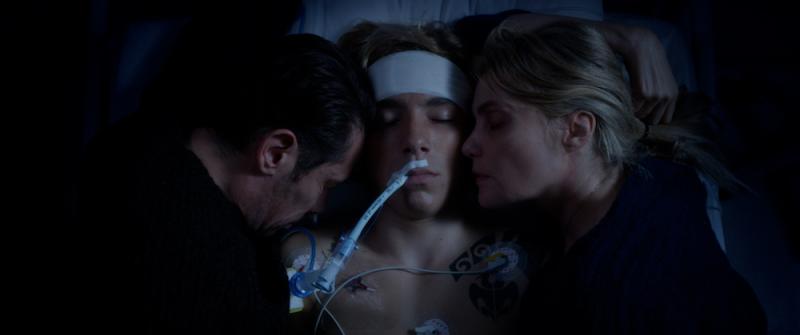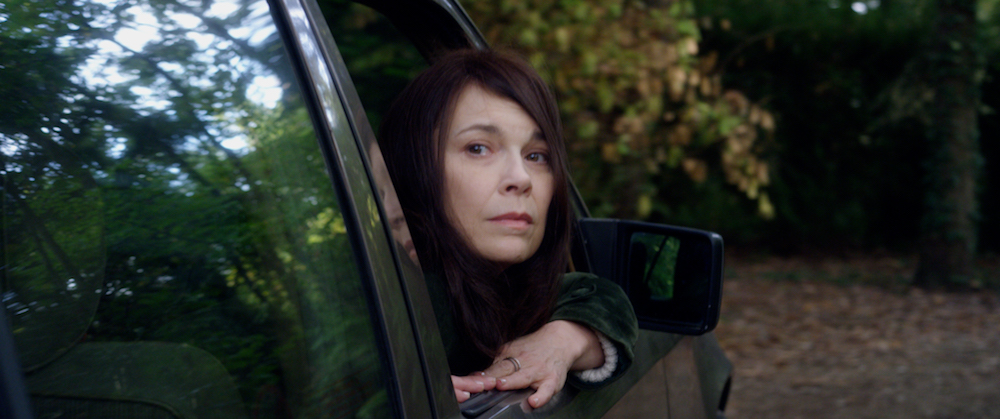Heal the Living review - 'lots of emotion, not enough life' | reviews, news & interviews
Heal the Living review - 'lots of emotion, not enough life'
Heal the Living review - 'lots of emotion, not enough life'
A heart transplant goes horribly right in Katell Quillévéré’s third feature

Three teenage boys meet at dawn. One of them, blonde and beautiful Simon (Gabin Verdet), jumps out of his girlfriend’s window and rides his bike through the dark Lyon streets to meet the others in their van. They drive almost silently to the beach, put on wetsuits and catch waves. A grey sea, a grey sky: we can hardly see where foam ends and cloud begins. It’s mesmerising, wordless, and the camerawork is superb, as is Alexandre Desplat’s score.
Katell Quillévéré’s third feature starts out as if it could be a coming-of-age movie like her previous features, Love Like Poison and the wonderful Suzanne. But there’s no coming of age for 17-year-old Simon. That first scene, and one flashback, are all we see of his life; then, after the van crashes, he’s brain-dead, in a coma. The other two boys survive (Simon wasn’t wearing a seat-belt), but we don’t see them again either.
Instead a series of characters, none of whom we get to know well enough, appear during the next 48 hours: the parents (Polanski muse Emmanuelle Seigner and rap artist/actor Kool Shen), separated but brought together in grief; head surgeon (Bouli Lanners) and nurse (Monia Chokri); the organ-donor consultant (an impressive, understated Tahar Rahim, star of A Prophet); and, in the second half of the film, the woman who is waiting for a heart transplant (Anne Dorval, pictured below). Simon’s heart, in fact. But will his parents allow the organ donation? Will the heart reach the recipient in time?
 All are fine actors but there is something mechanical and flat about Quillévéré’s method of supplying revelatory glimpses that don’t quite ring true and aren’t followed up. Thomas tries to relax at work by watching Algerian goldfinches on YouTube – “they have human emotions,” he says – while the nurse has an erotic fantasy in the hospital lift; the mother puts on earmuffs and drinks coffee as she watches her ex-husband wielding noisy boat-building machinery, and the surgeon fancies himself as a hipster, giving fist bumps and listening to hip-hop. Sadly, none of this helps the characters come alive, which in a film about life and death is a disadvantage.
All are fine actors but there is something mechanical and flat about Quillévéré’s method of supplying revelatory glimpses that don’t quite ring true and aren’t followed up. Thomas tries to relax at work by watching Algerian goldfinches on YouTube – “they have human emotions,” he says – while the nurse has an erotic fantasy in the hospital lift; the mother puts on earmuffs and drinks coffee as she watches her ex-husband wielding noisy boat-building machinery, and the surgeon fancies himself as a hipster, giving fist bumps and listening to hip-hop. Sadly, none of this helps the characters come alive, which in a film about life and death is a disadvantage.
Quillévéré adapted the screenplay from the best-selling 2014 French novel Mend the Living by Maylis de Kerangal, which in its English translation has just won the Wellcome Prize. The book is full of fervent descriptive passages, medical techno-speak, page-long sentences and very little dialogue – a tough nut to crack. The character of Claire, the 50-year-old woman waiting for the heart, is developed by Quillévéré: she is a single mother with two adult sons, young men who are trying to cope with her deteriorating health and her ambivalence about the transplant. "I’m not sure I want a dead person’s heart," she tells her doctor. She’s in an on-off relationship with a concert pianist, a woman who returns to her after she breaks the news about the impending surgery. There are tears, lots of emotion, but it feels arbitrary and undeserved.
Of course, the transplant goes ahead and we’re in ER/Grey’s Anatomy territory, with every minute of the meticulously researched surgery enacted. Could anything go wrong? You wish. But it’s very realistic, this latex organ, with its electric motor pulsing away – a pump, but also a metaphor for the soul. This lyrical, often beautiful but finally unsatisfying film ends (not particularly appropriately) with Bowie's "Five Years" and a shot of Claire’s sons, sleeping in the hospital waiting-room with their heads together, in the same pose as Simon and friend on that fateful journey in the van.
rating
Share this article
The future of Arts Journalism
You can stop theartsdesk.com closing!
We urgently need financing to survive. Our fundraising drive has thus far raised £49,000 but we need to reach £100,000 or we will be forced to close. Please contribute here: https://gofund.me/c3f6033d
And if you can forward this information to anyone who might assist, we’d be grateful.

Subscribe to theartsdesk.com
Thank you for continuing to read our work on theartsdesk.com. For unlimited access to every article in its entirety, including our archive of more than 15,000 pieces, we're asking for £5 per month or £40 per year. We feel it's a very good deal, and hope you do too.
To take a subscription now simply click here.
And if you're looking for that extra gift for a friend or family member, why not treat them to a theartsdesk.com gift subscription?
more Film
 London Film Festival 2025 - crime, punishment, pop stars and shrinks
Daniel Craig investigates, Jodie Foster speaks French and Colin Farrell has a gambling habit
London Film Festival 2025 - crime, punishment, pop stars and shrinks
Daniel Craig investigates, Jodie Foster speaks French and Colin Farrell has a gambling habit
 I Swear review - taking stock of Tourette's
A sharp and moving tale of cuss-words and tics
I Swear review - taking stock of Tourette's
A sharp and moving tale of cuss-words and tics
 A House of Dynamite review - the final countdown
Kathryn Bigelow's cautionary tale sets the nuclear clock ticking again
A House of Dynamite review - the final countdown
Kathryn Bigelow's cautionary tale sets the nuclear clock ticking again
 theartsdesk Q&A: Idris Elba on playing a US President faced with a missile crisis in 'A House of Dynamite'
The star talks about Presidential decision-making when millions of lives are imperilled
theartsdesk Q&A: Idris Elba on playing a US President faced with a missile crisis in 'A House of Dynamite'
The star talks about Presidential decision-making when millions of lives are imperilled
 Urchin review - superb homeless drama
Frank Dillane gives a star-making turn in Harris Dickinson’s impressive directorial debut
Urchin review - superb homeless drama
Frank Dillane gives a star-making turn in Harris Dickinson’s impressive directorial debut
 Mr Blake at Your Service review - John Malkovich in unlikely role as an English butler
Weird comedy directed by novelist Gilles Legardinier
Mr Blake at Your Service review - John Malkovich in unlikely role as an English butler
Weird comedy directed by novelist Gilles Legardinier
 Don't Let's Go to the Dogs Tonight review - vivid adaptation of a memoir about a Rhodesian childhood
Embeth Davidtz delivers an impressive directing debut and an exceptional child star
Don't Let's Go to the Dogs Tonight review - vivid adaptation of a memoir about a Rhodesian childhood
Embeth Davidtz delivers an impressive directing debut and an exceptional child star
 One Battle After Another review - Paul Thomas Anderson satirises America's culture wars
Leonardo DiCaprio, Teyana Taylor, and Sean Penn star in a rollercoasting political thriller
One Battle After Another review - Paul Thomas Anderson satirises America's culture wars
Leonardo DiCaprio, Teyana Taylor, and Sean Penn star in a rollercoasting political thriller
 Steve review - educator in crisis
Cillian Murphy excels as a troubled headmaster working with delinquent boys
Steve review - educator in crisis
Cillian Murphy excels as a troubled headmaster working with delinquent boys
 Can I get a Witness? review - time to die before you get old
Ann Marie Fleming directs Sandra Oh in dystopian fantasy that fails to ignite
Can I get a Witness? review - time to die before you get old
Ann Marie Fleming directs Sandra Oh in dystopian fantasy that fails to ignite
 Happyend review - the kids are never alright
In this futuristic blackboard jungle everything is a bit too manicured
Happyend review - the kids are never alright
In this futuristic blackboard jungle everything is a bit too manicured

Add comment